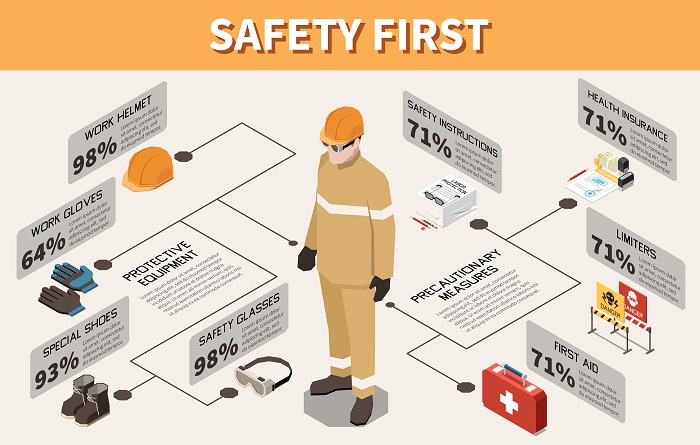Managing health and safety is a crucial responsibility for any organisation. Ensuring compliance, protecting employees, and fostering a safe work environment are fundamental to operational success and employee well-being. However, maintaining an up-to-date health and safety strategy can be challenging, especially for companies with limited in-house resources or evolving risk profiles. This is where external health and safety support can play an invaluable role, offering expertise, resources, and guidance to streamline compliance and strengthen workplace safety.
Here, we outline five reasons why seeking external support for your health and safety needs can be a strategic choice for organisations of all sizes.
1. Access to Specialist Knowledge and Expertise
Health and safety regulations are detailed and often industry-specific, with rules that vary depending on factors such as industry, location, and size of the workforce. For organisations without an in-house health and safety specialist, navigating these regulations can be complex and time-consuming. External health and safety providers bring a wealth of specialised knowledge and experience, ensuring that your business remains compliant and protected.
External experts can help you:
- Interpret complex regulations: They break down regulations into clear, actionable steps tailored to your industry.
- Identify industry-specific risks: Specialists understand the unique hazards in various sectors, from manufacturing to healthcare, and can provide insights into managing these risks effectively.
- Keep up with regulatory changes: Compliance experts stay updated on the latest health and safety laws, ensuring that your policies and practices align with current standards.
Accessing specialist knowledge helps ensure that your health and safety measures are both comprehensive and compliant, reducing the risk of costly errors and ensuring employee safety.
2. Cost-Effectiveness and Resource Efficiency
Hiring and training in-house health and safety professionals can be a significant investment, particularly for smaller organisations or those with limited budgets. Outsourcing health and safety support can provide cost-effective access to high-level expertise without the expenses associated with full-time staff. Additionally, external support can be scaled based on your specific needs, allowing for greater flexibility and control over costs.
With external support, organisations benefit from:
- Flexible service options: External providers often offer tailored packages, allowing you to choose the level of support that best fits your budget and requirements.
- Reduced training costs: Hiring in-house experts requires continuous training to stay updated with regulations. External providers manage this for you, saving time and money.
- Enhanced productivity: By outsourcing health and safety management, your team can focus on core activities, knowing that compliance and safety concerns are in capable hands.
External health and safety support is an efficient way to access professional expertise, reducing costs while ensuring that safety standards are upheld.
3. Streamlined Compliance and Risk Management
Staying compliant with health and safety regulations is crucial for any business. However, maintaining compliance requires regular risk assessments, policy updates, and training, which can be challenging to manage internally. External health and safety providers streamline the process, conducting thorough risk assessments and helping you develop and implement policies that meet the latest standards.
External support helps with:
- Consistent risk assessments: External experts conduct regular, unbiased risk assessments, identifying hazards that may go unnoticed by internal teams.
- Policy development and implementation: Providers assist in creating clear, compliant health and safety policies that are easy for employees to understand and follow.
- Audit preparation: If your organisation is subject to regulatory audits, external support can ensure you’re well-prepared, reducing the risk of non-compliance.
By streamlining compliance and risk management, external providers help prevent accidents, reduce liability, and promote a culture of safety within the organisation.
4. Improved Training and Employee Engagement
Employee training is a cornerstone of effective health and safety management, ensuring that staff are equipped with the knowledge and skills to work safely. However, designing and delivering engaging training programmes that meet regulatory requirements can be time-intensive and complex. External health and safety providers offer professional training solutions that are tailored to your organisation’s specific needs, ensuring compliance while improving employee engagement.
Benefits of external support for training include:
- Customised training programmes: External providers design training specific to the risks associated with each role, from hazard awareness to emergency response procedures.
- Flexible delivery options: External experts offer digital or in-person training, allowing employees to complete modules at their own pace or attend workshops that fit their schedules.
- Ongoing support and refresher courses: Regular refresher training keeps safety practices top-of-mind, and external providers can track completion rates to ensure compliance.
Professional training solutions make it easier to engage employees, instilling a proactive approach to health and safety that helps prevent accidents and promotes a safer work environment.
5. Fostering a Proactive Safety Culture
A strong health and safety culture requires more than just compliance; it involves a commitment to continuous improvement, open communication, and shared responsibility. External support plays a valuable role in fostering this culture, providing guidance on best practices and creating an environment where employees feel comfortable reporting hazards and participating in safety initiatives.
With the help of external experts, organisations can:
- Encourage open communication: Providers can set up anonymous reporting channels, allowing employees to report hazards or incidents without fear of retaliation.
- Establish safety goals and metrics: External providers help organisations set realistic health and safety goals and track progress, creating a sense of achievement and shared accountability.
- Promote employee participation: By involving employees in safety discussions and encouraging feedback, external support fosters a workplace where everyone feels responsible for maintaining a safe environment.
A proactive safety culture reduces incident rates, boosts morale, and shows employees that their safety and well-being are a top priority. External support ensures that health and safety practices are integrated into daily operations, supporting a positive and responsible workplace culture.
Conclusion
Health and safety compliance is essential, but managing it effectively requires expertise, consistency, and a proactive approach. Seeking external health and safety support offers organisations access to specialised knowledge, efficient compliance management, and the tools to foster a strong safety culture. By partnering with external experts, businesses can reduce risk, enhance employee engagement, and create a safer, more productive workplace.
Whether your organisation is seeking to streamline compliance, improve training, or build a proactive safety culture, external support provides the resources and expertise needed to succeed. Investing in health and safety support isn’t just about meeting regulations – it’s about building a foundation of safety and trust that strengthens your organisation as a whole.










Got a Questions?
Find us on Socials or Contact us and we’ll get back to you as soon as possible.